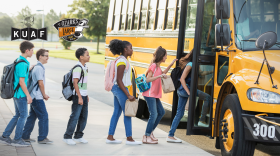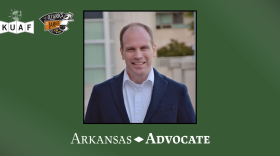The Winthrop Rockefeller Institute released their Civic Health Index report in December 2023 for the state of Arkansas. As we reported in January on Ozarks at Large, The state is low on indicators like voter turnout and voter registration. But the report also shows that Arkansas does well when it comes to charitable giving and connectedness. That connectedness has been highlighted this spring and summer as the institute has taken to the road to host listening sessions across the state in local communities. Shana Chaplin is the chief program officer for the organization. She says the sessions so far have actually focused less on politics and voter engagement.
Shana Chaplin: And really look at what some of the social values of those communities, the individuals there, are. You know, the good news from the report to me was that Arkansas scores really high in social connectedness. That’s an issue in a lot of other states. The reason that’s good news to me is it says the people of Arkansas still value connectedness. They value their neighbors, supporting and working with community members. So, we have really tried to drill down to look at what barriers may be keeping people from engaging in the local community. How aware are they of the issues in their community? Do they feel like they have access to trusted news sources? I know you all are aware that’s a growing issue—just access to local news.
So, we want to look at all those elements primarily because we believe that has as much to do with people engaging in elections. If you are not connected to your neighbors or your local community, it’s pretty doubtful that your first engagement will be voting in a local or national election. If we don’t build that foundation of civic engagement, we’re not going to see any change—I don’t believe—in voter registration or turnout data.
Matthew Moore: So far, you’ve been to Van Buren County, Clark County, Faulkner County, White County, and Crittenden County. Are you noticing any trends between these spaces and conversations?
Chaplin: We have. We have begun to see a trend. We are hearing that people miss their local news and newspapers. I think many community members don’t understand and may not even be aware of why that has gone away and the issues there, but they do desire that. So, we are hearing that consistently. We are also hearing that people lack civic education. It’s not just that people think kids aren’t getting enough civic education; people themselves don’t feel educated civically. They’ve lost touch with what local government does. You know, if it’s a water issue, is that a local or state issue? So, there’s a real desire for increased civic understanding and education.
We are also hearing from almost every community, regardless of socioeconomic makeup, that communities are losing local civic spaces, like community centers and senior centers—those neutral, municipal or community-owned spaces where people can feel safe together. Not just in terms of physical safety, but a safe space to have dialogue and work on initiatives or celebrate community. Those spaces are on the decline, and people are concerned. They’re worried about the economic impact on their communities and the loss of motivation to connect in those ways.
Moore: I imagine raising awareness of this issue is important, but how do we move toward activating solutions?
Chaplin: That’s the challenge. As soon as we launched the report, everyone wanted answers. We would love to sit at the institute on top of Petit Jean Mountain and say we have the answers, but we’ve also learned from the lessons of Governor Rockefeller that the best way to find answers is to involve local communities. We have a group of “civic activators”—key partners, organizations, and individuals—committed to leveraging their resources, whether fiscal, personnel, or program initiatives, to come together. They will meet on the mountain Aug. 16-17 to dig into these emerging themes and discuss best practices we see in the state and around the country. They’ll start identifying possible “low-hanging fruit.”
We’ve also committed to working with the Municipal League. Mayors have shown a real interest in civility training for themselves and city council members, and we’re developing some educational training and certificate programs for all communities and citizens, initially targeting mayors and city councils.
Matthew, the other thing is we didn’t get here overnight in Arkansas or the country. This is hard work. Taking it to the local level will be a slow process, requiring trust-building with local communities and ourselves. Our hope, through this collaborative initiative called Civic Arkansas, is to facilitate that in local communities and with civic activators to align our efforts and prioritize impactful areas.
Moore: The listening sessions are still happening across the state. On August 13, there will be a session at the Arvest Conference Center in Bentonville, which Benton County residents are encouraged to attend. Can you tell folks what to expect and what to come prepared with?
Chaplin: It’s a very neutral and safe space to share thoughts and ideas. Each session typically lasts around 90 minutes. We do a survey—anonymous—to gather basic information about voting and engagement practices. Then we move into a dialogue. We give people an opportunity to give input individually via sticky notes on some of the findings. We then gather them back together to discuss what stood out to them. We break them into small groups, with each step designed to help people become more comfortable with one another. Honestly, Matthew, we have seen a really robust dialogue in every community, often extending beyond the planned 90 minutes as community members become more open and interested in the conversation.
We take that information back and use it to track feedback and identify these themes. We will publish a report in late fall that compiles these findings and identifies more than the initial three themes. We’ll work with activators and thought partners to prioritize them and provide opportunities for increased engagement.
In the fall, we will also start collegiate listening sessions. We are working with a couple of institutions to set those up and look forward to hearing from college students on these issues.
Moore: As someone who came in with expectations and knowledge of what you wanted to present, what has surprised you about these listening sessions?
Chaplin: Oh gosh, it’s been both a surprise and not a surprise. One, I love the people of Arkansas, and I’ve always loved local work; that’s been my history and career path. But it is evident at the local level that people really long for healthy, thriving communities. The biggest barrier for some is to weed through the national noise and become more aware of local concerns. I’ve been surprised at how quickly we can bring a group from knowing only a few people to everyone engaging deeply by the end of the night. Sometimes we even have to stop the conversation because we’re out of time. I love that, and I’ve loved seeing that in the people of Arkansas—a real desire to be part of the solution but needing help identifying the pathways.
Ozarks at Large transcripts are created on a deadline. This text may not be in its final form and may be updated or revised in the future. The authoritative record of KUAF programming is the audio record.
———————————————————————————————————————
Support KUAF and Keep Public Radio Thriving
For more than 50 years, KUAF has been your source for reliable news, enriching music, and community connection. Your support allows us to bring you trustworthy journalism through programs like Morning Edition, All Things Considered and Ozarks at Large. As we build for the next 50 years, we need your support for KUAF to ensure we continue to provide the news, music, and connections you value. Your support is not just appreciated; it's essential. Make your gift today here.
Thank you for supporting KUAF!
————————————————————————————————————————








